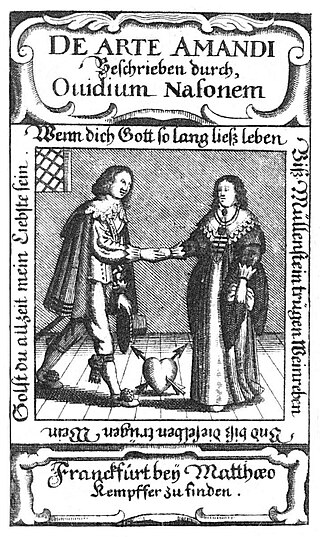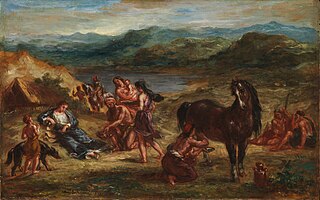Contents
Before going into detail about ancient Roman cosmetics, Ovid emphasizes manners as a timeless feature of beauty and attractiveness. [7]
In the second half of the Medicamina Faciei Femineae, Ovid displays his command of the poet's art in taking a practical manual replete with technical details and transforming it into effective verse. [8] Despite the facetious nature of the introduction, the five recipes included in the final 50 lines seem to be genuine, or at least plausible, cosmetic treatments. A representative example is a mixture of barley, vetch, egg, hartshorn, narcissus bulb, gum, Tuscan spelt, and honey. [9] Ovid promises that any woman who uses this concoction on her face "will shine smoother than her own mirror." [10]
The majority of the ingredients Ovid prescribes are in fact effective skin treatments, and several, such as oatmeal, wheat germ and egg white, are still used in the manufacture of cosmetics and pharmaceuticals today. [11] On this point, Ovid contrasts favorably with the Roman natural philosopher Pliny the Elder, whose compendious treatment of facial remedies often includes exotic, poisonous, or disgusting ingredients. [12]
The elegiac couplet is a poetic form used by Greek lyric poets for a variety of themes usually of smaller scale than the epic. Roman poets, particularly Catullus, Propertius, Tibullus, and Ovid, adopted the same form in Latin many years later. As with the English heroic couplet, each pair of lines usually makes sense on its own, while forming part of a larger work.

Publius Ovidius Naso, known in English as Ovid, was a Roman poet who lived during the reign of Augustus. He was a younger contemporary of Virgil and Horace, with whom he is often ranked as one of the three canonical poets of Latin literature. The Imperial scholar Quintilian considered him the last of the Latin love elegists. Although Ovid enjoyed enormous popularity during his lifetime, the emperor Augustus exiled him to Tomis, the capital of the newly-organised province of Moesia, on the Black Sea, where he remained for the last nine or ten years of his life. Ovid himself attributed his banishment to a "poem and a mistake", but his reluctance to disclose specifics has resulted in much speculation among scholars.
In Greek mythology, the Crinaeae were a type of Naiad nymphs associated with fountains or wells.
In Greek mythology, the name Halaesus or Halesus may refer to:
Didacticism is a philosophy that emphasizes instructional and informative qualities in literature, art, and design. In art, design, architecture, and landscape, didacticism is a conceptual approach that is driven by the urgent need to explain.
The adjective elegiac has two possible meanings. First, it can refer to something of, relating to, or involving, an elegy or something that expresses similar mournfulness or sorrow. Second, it can refer more specifically to poetry composed in the form of elegiac couplets.

The Ars amatoria is an instructional elegy series in three books by the ancient Roman poet Ovid. It was written in 2 AD.

The Georgics is a poem by Latin poet Virgil, likely published in 29 BCE. As the name suggests the subject of the poem is agriculture; but far from being an example of peaceful rural poetry, it is a work characterized by tensions in both theme and purpose.

The Eclogues, also called the Bucolics, is the first of the three major works of the Latin poet Virgil.
Ibis is a curse poem by the Roman poet Ovid, written during his years in exile across the Black Sea for an offense against Augustus. It is "a stream of violent but extremely learned abuse," modeled on a lost poem of the same title by the Greek Alexandrian poet Callimachus.

The Heroides, or Epistulae Heroidum, is a collection of fifteen epistolary poems composed by Ovid in Latin elegiac couplets and presented as though written by a selection of aggrieved heroines of Greek and Roman mythology in address to their heroic lovers who have in some way mistreated, neglected, or abandoned them. A further set of six poems, widely known as the Double Heroides and numbered 16 to 21 in modern scholarly editions, follows these individual letters and presents three separate exchanges of paired epistles: one each from a heroic lover to his absent beloved and from the heroine in return.

The Fasti, sometimes translated as The Book of Days or On the Roman Calendar, is a six-book Latin poem written by the Roman poet Ovid and published in AD 8. Ovid is believed to have left the Fasti incomplete when he was exiled to Tomis by the emperor Augustus in 8 AD. Written in elegiac couplets and drawing on conventions of Greek and Latin didactic poetry, the Fasti is structured as a series of eye-witness reports and interviews by the first-person vates with Roman deities, who explain the origins of Roman holidays and associated customs—often with multiple aetiologies. The poem is a significant, and in some cases unique, source of fact in studies of religion in ancient Rome; and the influential anthropologist and ritualist J.G. Frazer translated and annotated the work for the Loeb Classical Library series. Each book covers one month, January through June, of the Roman calendar, and was written several years after Julius Caesar replaced the old system of Roman time-keeping with what would come to be known as the Julian calendar.
Adrian Swayne Hollis was an English classical scholar and correspondence chess grandmaster, the title having been awarded in 1976.
Hylonome was a female centaur in Greek mythology.
Elegiac comedy was a genre of medieval Latin literature—or drama—represented by about twenty texts written in the 12th and 13th centuries in the liberal arts schools of west central France. Though commonly identified in manuscripts as comoedia, modern scholars often reject their status as comedy. Unlike Classical comedy, they were written in elegiac couplets. Denying their true comedic nature, Edmond Faral called them Latin fabliaux, after the later Old French fabliaux, and Ian Thomson labelled them Latin comic tales. Other scholars have invented terms like verse tales, rhymed monologues, epic comedies, and Horatian comedies to describe them. The Latin "comedies", the dramatic nature of which varies greatly, may have been the direct ancestors of the fabliaux but more likely merely share similarities. Other interpretations have concluded that they are primitive romances, student juvenilia, didactic poems, or merely collections of elegies on related themes.
Cosmetics, first used in ancient Rome for ritual purposes, were part of daily life. Some fashionable cosmetics, such as those imported from Germany, Gaul and China, were so expensive that the Lex Oppia tried to limit their use in 189 BCE. These "designer brands" spawned cheap knock-offs that were sold to poorer women. Working-class women could afford the cheaper varieties, but may not have had the time to apply the makeup as the use of makeup was a time-consuming affair because cosmetics needed to be reapplied several times a day due to weather conditions and poor composition.

In classical studies the term epyllion refers to a comparatively short narrative poem that shows formal affinities with epic, but betrays a preoccupation with themes and poetic techniques that are not generally or, at least, primarily characteristic of epic proper.

Ovid, the Latin poet of the Roman Empire, was banished in 8 AD from Rome to Tomis by decree of the emperor Augustus. The reasons for his banishment are uncertain. Ovid's exile is related by the poet himself, and also in brief references to the event by Pliny the Elder and Statius. At the time, Tomis was a remote town on the edge of the civilized world; it was loosely under the authority of the Kingdom of Thrace, and was superficially Hellenized. According to Ovid, none of its citizens spoke Latin, which as an educated Roman, he found trying. Ovid wrote that the cause of his exile was carmen et error, probably the Ars Amatoria and a personal indiscretion or mistake. The council of the city of Rome revoked his exile in December 2017, some 2000 years after his banishment.

Philitas of Cos, sometimes spelled Philetas, was a Greek scholar, poet and grammarian during the early Hellenistic period of ancient Greece. He is regarded as the founder of the Hellenistic school of poetry, which flourished in Alexandria after about 323 BC. Philitas is also reputed to have been the tutor of Ptolemy II Philadelphus and the poet Theocritus. He was thin and frail; Athenaeus later caricatured him as an academic so consumed by his studies that he wasted away and died.
Pegasides were nymphs of Greek mythology connected with wells and springs, specifically those that the mythical horse Pegasus created by striking the ground with his hooves.









